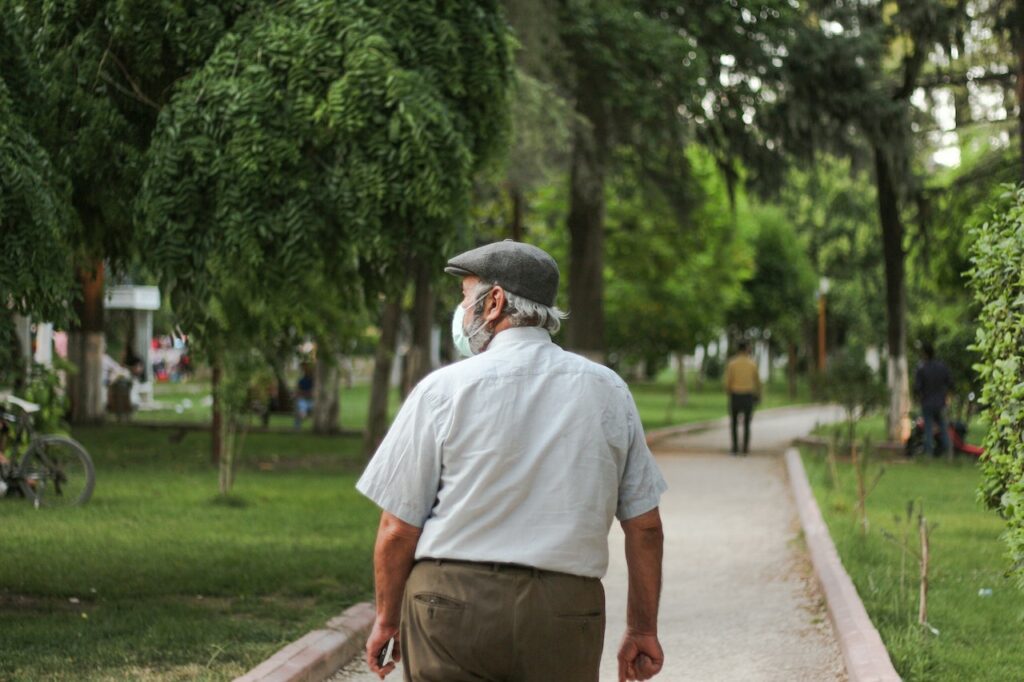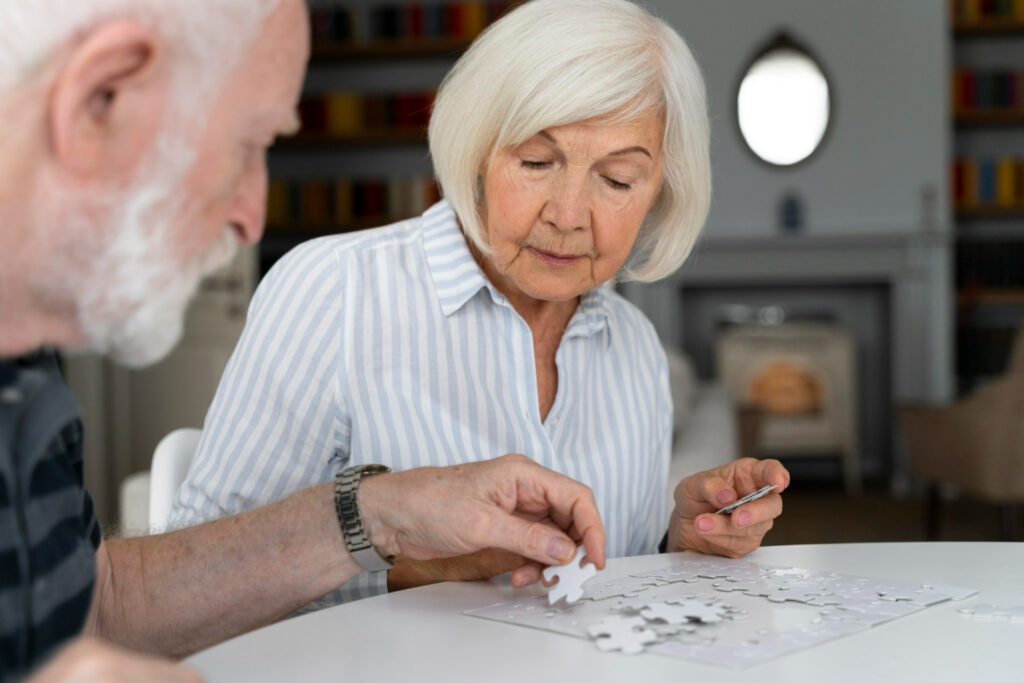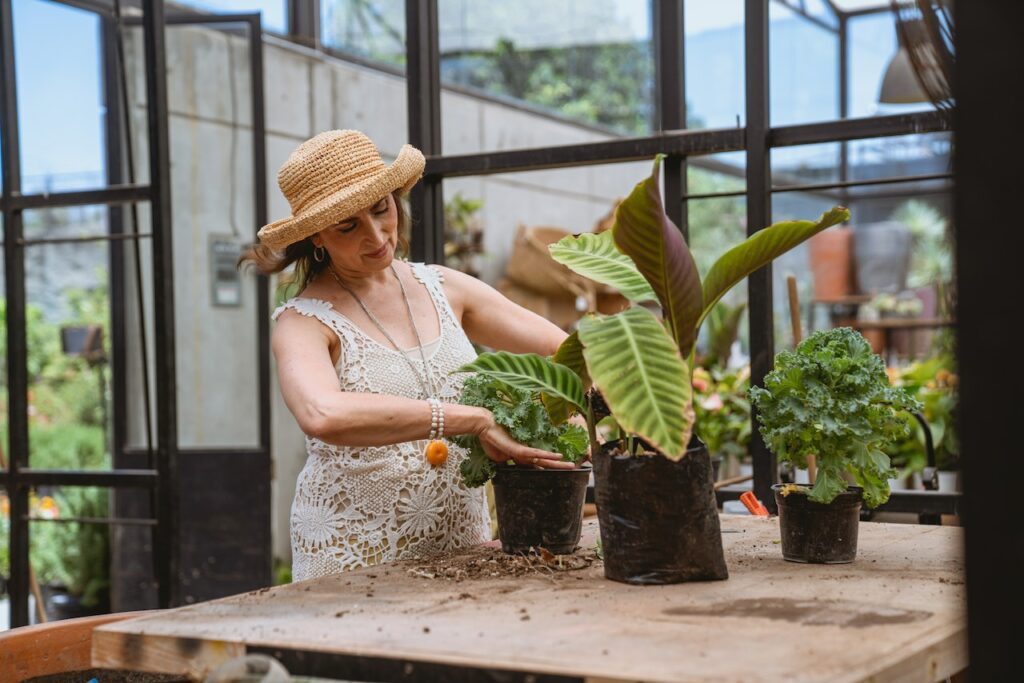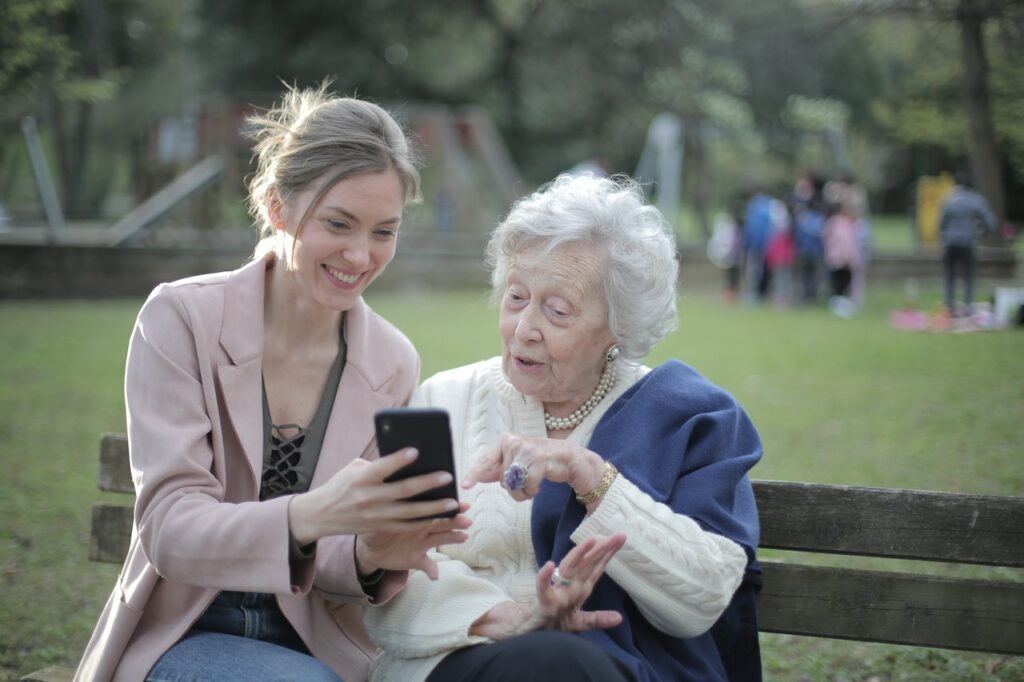The COVID-19 pandemic has threatened global health and mental well-being. Seniors, especially in the US, are prone to pandemic psychological consequences. The pandemic’s enormous hardships affected elders’ mental health. Numerous research has illuminated the psychological effects of the pandemic on American seniors, revealing their experiences and lessons.
The APA studied the psychological consequences of the pandemic on elderly Americans. The research found that social isolation, health issues, and daily routine disruptions increased seniors’ anxiety, tension, and loneliness. The sudden end of social activities, fear of getting the virus, and lack of social contacts made this group feel lonely and alone.
These psychological issues harmed elders’ health and quality of life. Depression, anxiety, and insomnia increased in many people. The APA research found that seniors with pre-existing mental health disorders had more difficulty controlling their symptoms throughout the pandemic. Stress and restricted healthcare access damaged emotional, physical, and cognitive health.
However, seniors showed great tenacity and adaptation, and they emerged from this challenging era with lessons that may benefit us all. This essay explores and celebrates eight important pandemic lessons acquired by American seniors. Let’s remember what we learned during the pandemic!

Maintaining Relationships
Seniors realized the value of strong social bonds throughout the pandemic. Seniors acknowledged the necessity of remaining connected with loved ones when the globe confronted physical separation and societal constraints. They realized that human connection is essential to their well-being, providing emotional support, a feeling of belonging, and pleasure.
Seniors have found creative ways to communicate with family and friends throughout the pandemic. They used video chats, internet platforms, and social media to connect. Seniors have adapted to these new technologies and discovered that virtual conversations may still create a deep feeling of connection and intimacy, even when face-to-face visits are not feasible.
Seniors benefit much from social support. Seniors are particularly vulnerable to loneliness and isolation due to the pandemic. Seniors realize the importance of emotional support from loved ones. Seniors have seen how a meaningful chat, a chuckle, or a soothing voice on the other end of a video call have elevated their spirits, brought peace, and improved their mental health.
Seniors must maintain meaningful interactions after the pandemic. Seniors may telephone, video call, or visit loved ones regularly. Joining groups and organizations that share their interests might also help them make new friends. Seniors might also connect via hobbies or projects.
Healthy Self-Care
During the pandemic, elderly prioritize self-care. Seniors have understood that taking care of their physical and mental health, including exercise, proper food, and regular healthcare checkups, is crucial for a meaningful and healthy existence.
Physical exercise transforms seniors’ lives. Exercise throughout the pandemic benefited their physical and mental wellbeing. Seniors find peace and vigor in regular walks, yoga, and virtual exercise sessions. Physical exercise boosts energy, sleep, cognition, and well-being.
Seniors know the value of mental health, stress management, and physical activity. Pandemic stresses included viral dread, isolation, and uncertainty. Seniors have learned the importance of mental health and stress management. They practice mindfulness, meditation, hobbies, and professional assistance. These strategies have helped seniors decrease stress, anxiety, and build resilience.
Healthy living goes beyond exercise and stress management. Seniors know the value of a balanced diet, good nutrition, and frequent healthcare checkups. They know that healthy eating boosts immunity and brainpower. Seniors also schedule frequent doctor visits to get preventative care and address health issues.
Practical guidance is needed to help elders stay healthy. Walking, gardening, dancing, and swimming may help seniors. Fun and sustainable activities are needed. A balanced diet of fruits, vegetables, complete grains, and lean meats promotes optimum health. Seniors can also emphasize their preferred stress management methods, such as deep breathing, hobbies, and support networks. Seniors might also improve their mental health by seeking treatment or counseling.
Using Technology Everyday
Seniors embraced technology for everyday life when the COVID-19 pandemic forced a fast digitization. They are more tech-savvy now that they realize how much digital tools and platforms may improve their life.
Technology helps seniors access critical services. They may safely purchase items online using digital networks. Seniors now get virtual doctor’s visits at home. Technology helps elders stay connected and entertained by providing important information and entertainment.
The pandemic stressed senior digital literacy and lifelong learning. Seniors have taken advantage of digital skill-building opportunities. They recognize that technical skills give access to many resources. Seniors may study technology via online tutorials, seminars, or courses. Libraries and community organizations offer digital literacy classes for seniors.
Accordingly, technology has helped seniors better their everyday lives and social relationships. Seniors have reunited with old acquaintances and found new ones on social media, lessening loneliness. Seniors may also participate in hobbies, virtual interest groups, and cultural events online.
Understand that the elderly may struggle with technology. They overcame such obstacles, nevertheless. Family, friends, and local groups help seniors navigate the digital world. Seniors who have embraced technology have become mentors, sharing their skills and helping others learn digital tools.
RELATED POST: Key Locators, Pill Dispensers, and 5 Other Amazing Retirement Gadgets
Building Resilience and Adaptability
Seniors have learned to be cheerful despite the challenges. They enjoy life’s modest joys and remain cheerful and present. Seniors have found gratitude’s good effects on their well-being through appreciating tiny things. They have learned that an optimistic outlook helps them overcome difficulties.
Seniors must stay educated and prepared throughout the pandemic. They understand the need to remain current on health and safety rules. Seniors accepted professional advise to safeguard themselves and their families. Emergency preparations are also important to them. This readiness gives elders confidence to handle uncertainty.
We learned techniques to build resilience and adaptation to future problems. Seniors have found comfort in expressing appreciation for their blessings. Seniors have also benefited from community support, connecting with people who understand and provide encouragement. Maintaining a flexible perspective has helped seniors adapt, pivot, and solve difficulties.
Seniors might try many methods to build resilience and flexibility. Exercise, meditation, and writing boost emotional and mental resilience. Staying connected with loved ones, joining community organizations, or getting professional help may help through difficult times. Problem-solving and a growth attitude may help seniors adjust to new conditions and see failures as learning opportunities.
Living Simply
Many seniors have found comfort in living a simple lifestyle during the pandemic. They emphasize downsizing, prioritizing vital needs above material belongings, and finding pleasure in simple daily activities.
Seniors have become minimalists and decluttered. They simplified their homes since physical clutter may cause mental congestion. Seniors are sorting, purging, and decluttering. This has calmed, focused, and improved their living environments.
Seniors have emphasized essentials over stuff and decluttered. The pandemic prompted reflection and reprioritization. Seniors emphasize connections, experiences, and personal development above material stuff. They now prioritize meaningful relationships, enjoyable experiences, and self-improvement. Seniors are happier when they focus on these things.
Seniors have found satisfaction in simple activities thanks to their simpler lifestyle. Seniors find joy in simple things like gardening, reading, and spending time with family. These times are more meaningful than worldly stuff.
Post-pandemic elders may follow mindfulness and purposeful living tips to simplify their lives. Mindful consumerism entails contemplating purchasing, prioritizing necessities over desires, and avoiding overconsumption.
Community Appreciation
During the pandemic, seniors realized how important community is. They understand that a robust community network fosters belonging, resilience, and well-being by providing help in times of need.
Seniors saw communal assistance throughout the pandemic. During crises, they discovered they needed each other for support, encouragement, and friendship. Seniors valued their community network for emotional and financial support. Seniors received support in their communities via established mutual assistance organizations, casual neighborly check-ins, or joint initiatives to satisfy one other’s needs.
Seniors helping seniors during the pandemic was heartwarming. They formed mutual help clubs to provide food and essentials. Seniors protected and assisted their neighbors. Seniors’ generosity and camaraderie fostered togetherness and purpose.
Seniors might examine several options to maintain community relationships. Seniors may socialize and share interests by joining local groups or organizations. Volunteering helps the community and lets you make new friends. Seniors may celebrate and socialize at community activities, whether virtual or in-person. These activities help elders feel supported and purposeful after the pandemic.
Financial Readiness
Seniors must learn financial resilience and readiness throughout the pandemic. They understand the necessity of financial planning, money management, income diversification, and financial education and support.
Seniors know how important financial stability and preparedness are. The pandemic highlighted the need for emergency reserves and a financial strategy. Seniors learned that unexpected events may disturb financial security, and having savings and a financial plan offers a safety net.
Seniors have greater financial management and recognized areas for improvement by creating a realistic budget. They now separate critical and discretionary expenditures. Financial experts have helped seniors make educated choices, utilize their resources, and prepare for their financial future.
Diversifying income sources helps seniors avoid financial hardship. During economic instability, fixed income or retirement savings may not be enough. Seniors have tried part-time jobs, freelancing, and passive income sources. These ventures provide financial stability and flexibility by eliminating the dependency on one revenue source.
Financial knowledge and support have helped seniors plan financially. They use financial literacy classes, internet tools, and government efforts to increase their financial literacy and decision-making. Seniors are now financially literate. Online instructional materials, calculators, and planning tools help seniors evaluate their finances and prepare for the future. Government programs help elders manage financial planning.

Reassessing Priorities and Meaning
The pandemic forced elders to reflect and rethink their priorities, helping them realize what mattered most. This method taught them the value of lifelong learning, personal development, and significance.
During COVID, seniors contemplated their values, relationships, and objectives. The catastrophe disrupted their lives and made them rethink their priorities, revealing what matters most. Seniors valued meaningful relationships, closeness, and time together. They simplified their life to concentrate on pleasure and satisfaction.
Seniors prioritized self-improvement and lifetime learning throughout the pandemic. They enjoyed learning new skills, pursuing hobbies, and being creative with more time at home. Online classes, reading, and pursuing new interests gave seniors comfort and pleasure. Personal development stimulated the mind and gave purpose and achievement. We realized that personal meaning and values-aligned pursuits provide satisfaction. Seniors volunteered to help their communities. Mentoring gave elders a purpose. Pursuing interests and hobbies helped elders find pleasure and contentment.
Seniors might try several things to stay motivated after the pandemic. Goals—big or small—give direction and inspiration. Seniors might create goals for self-improvement or hobbies. Seniors may continue making a difference by volunteering, engaging in community initiatives, or supporting their causes. New hobbies and curiosity lead to new experiences and progress.
Conclusion
Seniors have been tested by the COVID-19 pandemic. Seniors have learned significant lessons that might inspire and advise others during this turbulent time. Seniors have learned lessons beyond the pandemic, including the necessity of remaining connected with loved ones, emphasizing self-care, and simplifying.
The pandemic has affected seniors psychologically. It has raised worry, tension, and loneliness, worsening mental health disorders and threatening well-being. Isolation, disturbed habits, and virus dread have psychologically affected seniors. However, these trials have shown incredible resilience, flexibility, and ingenuity.
Seniors know that strong social relationships protect against loneliness. They use technology to connect with family. Seniors know social support is crucial to their mental and emotional health.
The pandemic has also stressed elder self-care and health. They understand the benefits of exercise, proper nutrition, and frequent medical checkups. Seniors have learned the value of mental health, stress control, and enjoying simple activities.
The pandemic has made elders rethink their priorities and seek meaning. They have examined their beliefs, relationships, and personal ambitions to better grasp what important. Seniors value self-improvement, ongoing learning, and following their interests.
Seniors have shown tremendous grit and perseverance throughout the pandemic, despite psychological repercussions. Seniors’ knowledge has helped them navigate unpredictable times and appreciate life’s basics. Their stories emphasize the significance of social relationships, self-care, simplicity, community engagement, and meaning and purpose.
Seniors’ teachings of human perseverance and adaptation endure beyond the pandemic. These teachings may help people of all ages overcome obstacles, prioritize well-being, and live meaningfully.














